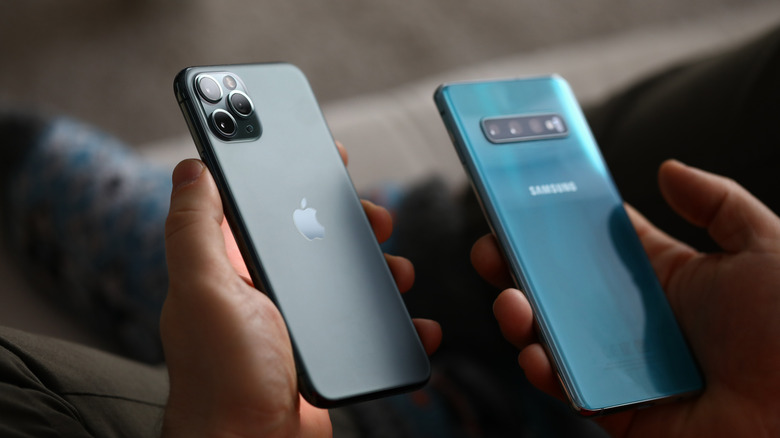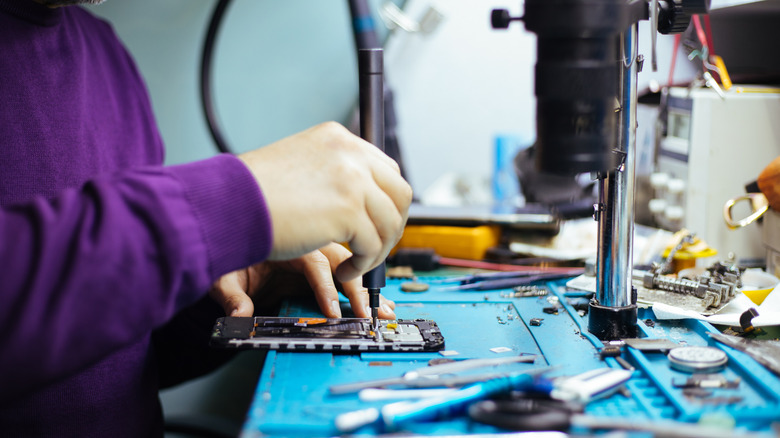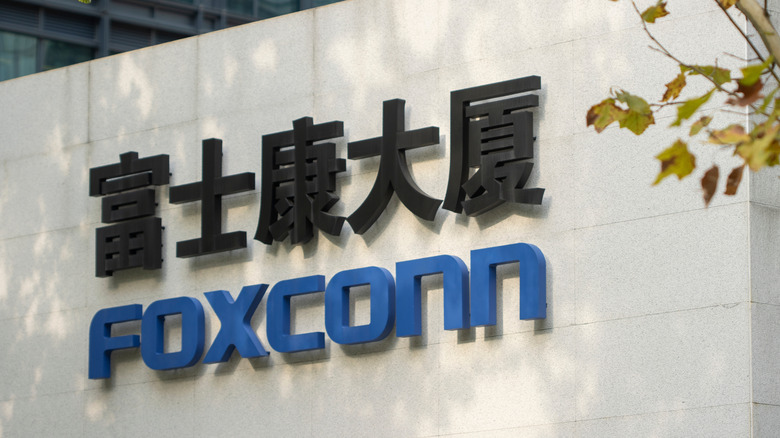Here's Which iPhone Parts Are Made By Samsung
Apple and Samsung may be rivals in the smartphone space, trying to one-up each other in each year's iterations of their flagship models. But when it comes to iPhone hardware, Samsung has been one of Apple's most important suppliers for years. Since the iPhone X in 2017, Apple has relied heavily on Samsung Display for its OLED panels. Even with Apple's push to diversify suppliers to LG and BOE, Samsung remains the dominant producer.
The reason is simple: no one matches Samsung's OLED technology at Apple's scale. Their panels deliver the brightness and color accuracy Apple demands. In fact, Samsung is often first to mass-produce new display types, like LTPO OLED, which powers ProMotion 120Hz refresh rates. It doesn't stop at screens. Samsung also manufactures advanced memory chips for iPhones. In some models, NAND flash storage and LPDDR DRAM modules are supplied by Samsung Semiconductor, though Apple balances orders across Micron, TSMC, and others.
iPhone chips are Apple's design, but Samsung helps build them
Apple's A-series processors are at the heart of every iPhone. These chips are designed entirely by Apple, but one of the little-known facts about the company is that its manufacturing has often involved Samsung. Before Apple moved most production to TSMC, Samsung played a major role in producing early A-series SoCs, including the A4 and A9. Even today, Samsung still produces smaller but essential chip components that complement Apple's in-house silicon. One example is foundry-level memory integration. Some batches of iPhones feature Samsung-built NAND flash modules or DRAM chips paired with Apple's A-series processors. These Samsung modules are soldered directly onto the logic board next to Apple's silicon, helping power multitasking and app responsiveness.
The irony is hard to ignore: Apple and Samsung fight for dominance in smartphone sales, yet their businesses are intertwined. Every time Apple sells a high-end iPhone, like this year's iPhone 17 Pro, Samsung profits in the background from display and chip orders. This dynamic has led Apple to invest significant resources into securing alternative suppliers, but so far, Samsung continues to hold the technological edge. Looking ahead, Apple may eventually shift more volume to BOE or LG for displays and rely on Micron for memory. But until those companies can consistently hit Apple's strict quality and yield requirements, Samsung will remain inside millions of iPhones. Rivalry aside, the iPhone is still partly a Samsung-powered device.
Major companies tied to the Apple supply chain
Apple's dominance in consumer tech relies on a supply chain that stretches across the globe. While the company designs its hardware in California, hundreds of suppliers provide the parts that make devices like the iPhone, iPad, and Mac possible. Apple's 2022 supplier list documented 200 companies operating more than 600 facilities, representing nearly all of its procurement. Foxconn, also known as Hon Hai Precision Industry, is among Apple's largest partners and handles much of the final iPhone assembly in China and India. Pegatron and Wistron, both Taiwan-based, also assemble Apple products, while Compal and Quanta manufacture iPads, MacBooks, and Apple Watches. TSMC operates as a vital supplier that manufactures Apple's A-series and M-series processors by utilizing its advanced semiconductor manufacturing capabilities.
China functions as a central location for AirPods manufacturing through GoerTek and Luxshare. These companies transfer some operations to Vietnam to decrease expenses. Japan delivers crucial elements through Sony camera sensors, Sharp display panels, and Murata capacitors. Corning, based in New York, produces the tough Gorilla Glass that covers iPhone screens. The U.S. provides wireless communication chips with Broadcom, Micron delivers memory solutions, and Qualcomm provides modem technology. Intel maintains its support for Apple through its own silicon transition. These partnerships show the scale of Apple's supply chain. While Apple exerts strict control over quality and costs, the company's devices are the result of contributions from some of the world's largest tech manufacturers.


